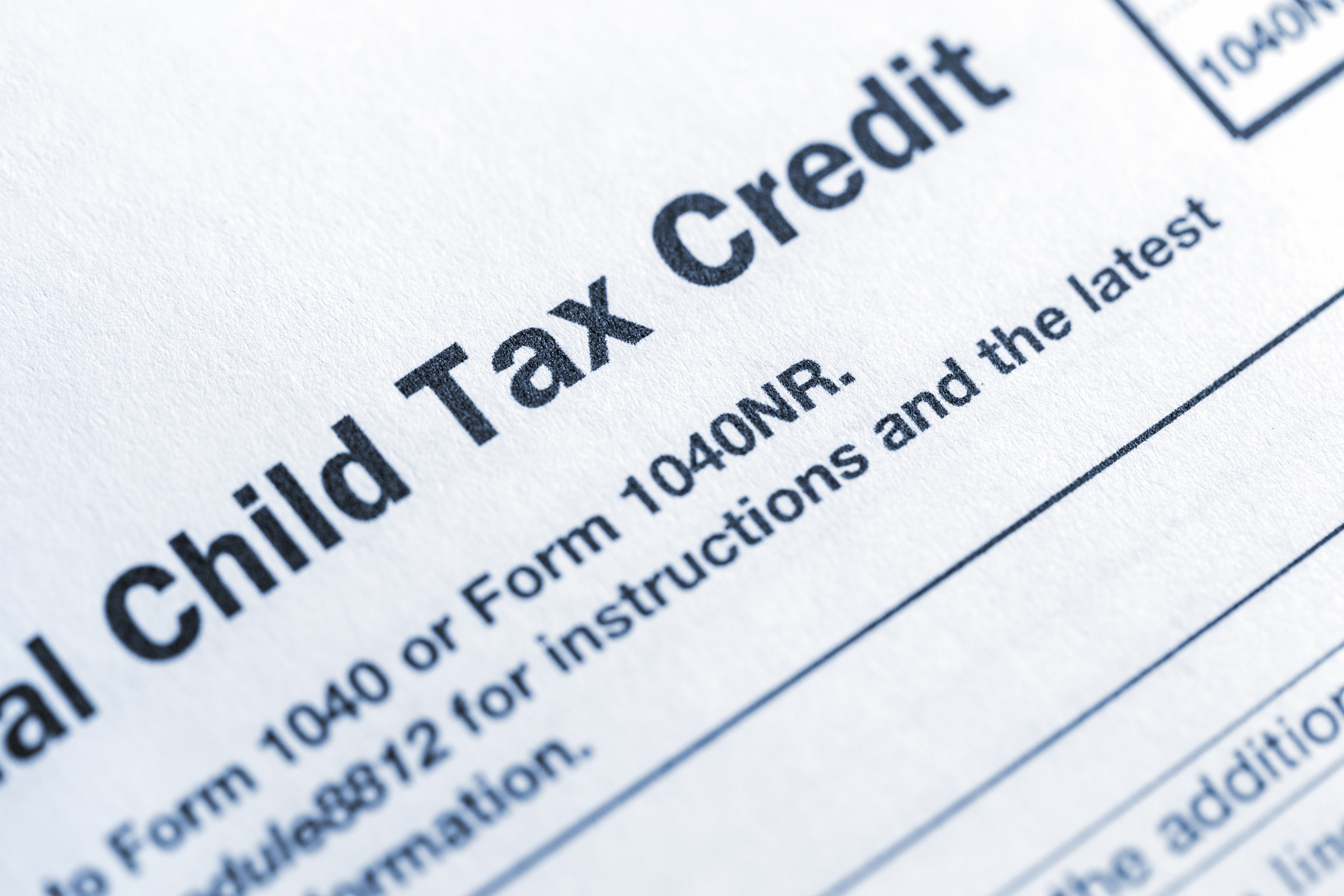How the 2025 Child Tax Credit Rules Impact Single Parents
New changes to family tax credits, like the Child Tax Credit, will impact the eligibility of some households.


Profit and prosper with the best of Kiplinger's advice on investing, taxes, retirement, personal finance and much more. Delivered daily. Enter your email in the box and click Sign Me Up.
You are now subscribed
Your newsletter sign-up was successful
Want to add more newsletters?

Delivered daily
Kiplinger Today
Profit and prosper with the best of Kiplinger's advice on investing, taxes, retirement, personal finance and much more delivered daily. Smart money moves start here.

Sent five days a week
Kiplinger A Step Ahead
Get practical help to make better financial decisions in your everyday life, from spending to savings on top deals.

Delivered daily
Kiplinger Closing Bell
Get today's biggest financial and investing headlines delivered to your inbox every day the U.S. stock market is open.

Sent twice a week
Kiplinger Adviser Intel
Financial pros across the country share best practices and fresh tactics to preserve and grow your wealth.

Delivered weekly
Kiplinger Tax Tips
Trim your federal and state tax bills with practical tax-planning and tax-cutting strategies.

Sent twice a week
Kiplinger Retirement Tips
Your twice-a-week guide to planning and enjoying a financially secure and richly rewarding retirement

Sent bimonthly.
Kiplinger Adviser Angle
Insights for advisers, wealth managers and other financial professionals.

Sent twice a week
Kiplinger Investing Weekly
Your twice-a-week roundup of promising stocks, funds, companies and industries you should consider, ones you should avoid, and why.

Sent weekly for six weeks
Kiplinger Invest for Retirement
Your step-by-step six-part series on how to invest for retirement, from devising a successful strategy to exactly which investments to choose.
For many single parents, applying for available federal tax credits and deductions can be a lifeline to support their families each year.
The first step begins by selecting the appropriate filing status, which can help you claim popular family tax breaks, like the Child Tax Credit (CTC), and potentially result in a larger tax refund. For qualifying families, a refund can help cover basic expenses related to your child or household finances. So planning accordingly and knowing which tax breaks are available for you is essential, especially this year.
That’s because the Trump administration’s so-called ‘One Big Beautiful Bill’ includes new rules that impact the Child Tax Credit amount and who qualifies for the family tax break.
From just $107.88 $24.99 for Kiplinger Personal Finance
Become a smarter, better informed investor. Subscribe from just $107.88 $24.99, plus get up to 4 Special Issues

Sign up for Kiplinger’s Free Newsletters
Profit and prosper with the best of expert advice on investing, taxes, retirement, personal finance and more - straight to your e-mail.
Profit and prosper with the best of expert advice - straight to your e-mail.
Here are some tax tips and changes you should consider if you’re a single parent.
File as a Head of Household
Navigating tax season with children doesn’t have to be intimidating, but before diving into tax credits, you should know your tax filing status.
Selecting the correct filing status on your tax return can help you maximize your tax savings as a single parent. The Head of Household filing status offers two main benefits:
You’ll be eligible for a larger standard deduction, and tax brackets are wider. That will come in handy when claiming certain tax breaks.
For instance, for the 2025 tax year, the standard deduction for a head of household filer is $23,625. Meanwhile, single filers are eligible for a deduction up to $15,750.
To qualify for the Head of Household filing status, you must meet the following criteria:
- Maintain a home for a qualifying person — this can include a child or a dependent
- Contribute more than half the cost of maintaining a household
- Are considered unmarried on the last day of the taxable year
If you believe you meet the Head of Household filing status criteria, that can make a significant difference in the amount of cash you may qualify for through a tax refund, like the Child Tax Credit.
Bigger Child Tax Credit in 2025
Parents and caregivers with dependent children under 17 can look forward to an enhanced tax break come tax filing season.
- Trump’s tax and spending package increases the federal Child Tax Credit from $2,000 to $2,200 per qualifying child, and indexes the amount to inflation annually.
- The maximum refundable portion is worth $1,700 in 2025. That’s the amount you can claim for tax returns generally filed in early 2026.
However, the amount you receive depends on your modified adjusted gross income (MAGI), the number of qualifying dependent children you have, and your filing status.
For example, the CTC begins to phase out when your MAGI exceeds $200,000 if you file as single, a head of household, or a qualifying widower. That means, if you’re a single parent, you can claim up to $2,200 per qualifying child if you earn less than that income threshold.
Folks who are married filing separately are ineligible for the CTC, and those filing jointly would have their credit phase out once their combined incomes surpass $400,000.
There’s also another major change that impacts who is eligible for the federal Child Tax Credit. To claim the CTC, the child and taxpayer (parent or guardian) must have a Social Security number.
For more information about the current child tax credit, see How Much is the Child Tax Credit for 2025?
Child Tax Credit 2025: New rules impact some parents

The Trump administration enacted new tax rules that impact who is eligible for the Child Tax Credit.
As mentioned, new rules for the child tax credit in 2025 affect the eligibility of some households, particularly mixed-status families.
Trump’s new policy requires children and parents or guardians to have a Social Security number to claim the federal child tax credit. This means that mixed-status households, including those with U.S. citizen children, are no longer eligible for the tax credit.
According to the Center for Migration Studies, as many as 4.5 million citizen and legally permanent resident children with SSNs will no longer qualify for the child tax credit under Trump’s new tax guidance.
Some states will be impacted more harshly than others, as an example:
- In California, an estimated 910,000 children would no longer qualify for the CTC
- In Texas, 875,000 U.S. citizen children would not qualify for the tax break
- In Florida, as many as 247,000 children would be prohibited from claiming the credit
Previously, parents who did not have a SSN were able to use an individual taxpayer identification number (ITIN) when filing their tax return to claim the CTC.
Don’t forget about other family tax breaks
While the child tax credit is a popular tax credit for families, there are also other tax breaks available for qualifying households. Some of these family tax breaks are enhanced starting in 2025.
- The Earned Income Tax Credit (EITC) is a refundable credit for low-and moderate-income workers with or without children.
- There’s an enhanced adoption tax credit for the 2025 tax year, and it’s worth up to $17,280.
- The Child and Dependent Care Tax Credit was permanently increased in Trump’s megabill, allowing households to claim 50% for qualifying expenses.
Lastly, if you’re not sure where to get started, it’s recommended that you seek guidance from a certified public accountant (CPA) or tax professional to help you determine which credits and deductions you may be eligible for.
Related Content
- 2025 Family Tax Credits: Four IRS Changes That Can Save You Money
- Trump’s ‘One Big, Beautiful Bill’ With Trillions in Tax Cuts: What to Know
- Biggest Winners and Losers in Trump’s New Tax Plan
Profit and prosper with the best of Kiplinger's advice on investing, taxes, retirement, personal finance and much more. Delivered daily. Enter your email in the box and click Sign Me Up.

Gabriella Cruz-Martínez is a finance journalist with 8 years of experience covering consumer debt, economic policy, and tax.
Gabriella’s work has also appeared in Yahoo Finance, Money Magazine, The Hyde Park Herald, and the Journal Gazette & Times-Courier.
As a reporter and journalist, she enjoys writing stories that empower people from diverse backgrounds about their finances, no matter their stage in life.
-
 Quiz: Do You Know How to Avoid the "Medigap Trap?"
Quiz: Do You Know How to Avoid the "Medigap Trap?"Quiz Test your basic knowledge of the "Medigap Trap" in our quick quiz.
-
 5 Top Tax-Efficient Mutual Funds for Smarter Investing
5 Top Tax-Efficient Mutual Funds for Smarter InvestingMutual funds are many things, but "tax-friendly" usually isn't one of them. These are the exceptions.
-
 AI Sparks Existential Crisis for Software Stocks
AI Sparks Existential Crisis for Software StocksThe Kiplinger Letter Fears that SaaS subscription software could be rendered obsolete by artificial intelligence make investors jittery.
-
 How to Open Your Kid's $1,000 Trump Account
How to Open Your Kid's $1,000 Trump AccountTax Breaks Filing income taxes in 2026? You won't want to miss Form 4547 to claim a $1,000 Trump Account for your child.
-
 In Arkansas and Illinois, Groceries Just Got Cheaper, But Not By Much
In Arkansas and Illinois, Groceries Just Got Cheaper, But Not By MuchFood Prices Arkansas and Illinois are the most recent states to repeal sales tax on groceries. Will it really help shoppers with their food bills?
-
 New Plan Could End Surprise Taxes on Social Security 'Back Pay'
New Plan Could End Surprise Taxes on Social Security 'Back Pay'Social Security Taxes on Social Security benefits are stirring debate again, as recent changes could affect how some retirees file their returns this tax season.
-
 New Gambling Tax Rule Impacts Super Bowl 2026 Bets
New Gambling Tax Rule Impacts Super Bowl 2026 BetsTaxable Income When Super Bowl LX hype fades, some fans may be surprised to learn that sports betting tax rules have shifted.
-
 Should You Do Your Own Taxes This Year or Hire a Pro?
Should You Do Your Own Taxes This Year or Hire a Pro?Taxes Doing your own taxes isn’t easy, and hiring a tax pro isn’t cheap. Here’s a guide to help you figure out whether to tackle the job on your own or hire a professional.
-
 Trump $10B IRS Lawsuit Hits an Already Chaotic 2026 Tax Season
Trump $10B IRS Lawsuit Hits an Already Chaotic 2026 Tax SeasonTax Law A new Trump lawsuit and warnings from a tax-industry watchdog point to an IRS under strain, just as millions of taxpayers begin filing their 2025 returns.
-
 Can I Deduct My Pet On My Taxes?
Can I Deduct My Pet On My Taxes?Tax Deductions Your cat isn't a dependent, but your guard dog might be a business expense. Here are the IRS rules for pet-related tax deductions in 2026.
-
 Don't Overpay the IRS: 6 Tax Mistakes That Could Be Raising Your Bill
Don't Overpay the IRS: 6 Tax Mistakes That Could Be Raising Your BillTax Tips Is your income tax bill bigger than expected? Here's how you should prepare for next year.